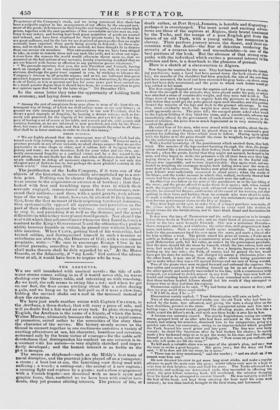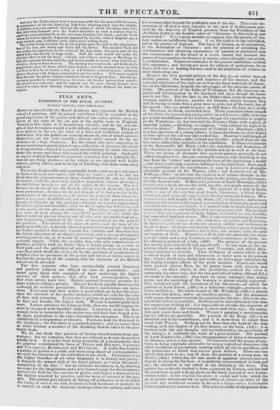THE ARETHUSA.
WE are still inundated with nautical novels : the tide of salt- water stories comes rolling in as if it would never ebb, its waves dashing over the library.table, and saturating us with sea-slang. As we read, the sofa seems to swing like a cot ; and when we get on our feet, the floor seems pitching about like a cabin during a gale, and we hang on by the bell-pull as if it were a clew-line, bidding the servant shake out a reef in the mainsail instead of draw the curtains.
We have just made another cruise with Captain CHAMIER, in the Arethusa, a threefiecker, that will carry a press of sale, and will no doubt find a fair wind on every tack. In plain shore-going English, the Arethusa is the name of a frigate, of which the hero, "Walter Murray, ultimately becomes the captain, by a rapid course of promotion, suited rather to the necessities of the story than the character of the service. His history merely serves as the -thread to connect together in one continuous narrative a variety of ,exciting adventures at sea, his character, heartless and covetous, redeemed only by the brute virtue of courage—for the noble self devotedness that distinguishes his conduct on one occasion is in- o insistent with his nature—is very slightly sketched and imper- fectly developed ; and the human interest is as feeble as the plot is meagre. The scenes on shipboard—such as the Middy's first taste of naval discipline, and the practical jokes played &on a youngster; a storm ; u boat lost at sea, the tarnishing crew dying mad with suffering ; a wreck; a cutting-out ; the arrival of' a new captain ; a running fight and capture by a pirate; and a close engagement with a French frigate—are described with so much spirit and graphic force, that, surfeited as we have been with similar inci- dents, they yet possess stirring interest. The picture of life, or
death rather, at Port Royal, Jamaica, is horrible and disguasdtivnegn.: perhaps it is overcharged. The most novel and exciting tures are those of the captives at Algiers, their brutal treatment by the Turks, and the escape of a poor English girl from the harem of an old Turk, with a young sailor, her companion is slavery. Their perilous journey across the desert, and their en. counters with the Arabs—the fear of detection rendering the security of a caravan unsafe and uncomfortable—is one of the best portions of the book. But the absence of that strong syre. pathy with the individual which excites a personal interest in his fortunes and fate, is a drawback to the pleasure of perusal. Here is a sketch of a slave-auction in Algiers.
Now began the auction for the men. They had been inspected by the intend- ing purchasers; many a hand had been passed down the back sinews of their legs, the muscles of the shoulders had been pinched, the size of the arm-hoce hail been measured, the head had been examined forgray hairs--in short, every halt had been duly scrutinized, and the price to which each bidder would lo was settled in his mind.
The first couple disposed of were the captain and one of his crew. In order to show the strength of the animals, they were placed under the pule, to which was attached a stone of considerable weight, and they wete told to lift it. The slings were of such a length as to require both the prisoners to bend down little before they could get the poles placed upon each shoulder, and this position showed the muscles of the legs and back to the greatest advantage. In vain they tried—evidently tried • the weight was more than their united power could apparently. move. 'the price fell ; the enraged pitate atked what would be the highest bidding if they lifted the stone, and a considerable advance was immediately offered by the government if such should occur ; whereas, in the event of a failure, the price was so much depreciated as to very materially dig. comfort the pirate.
lie called four of his men, who were armed with long sticks, about the cir- cumference of a man's finger, and Inc placed them so as to command a good position for inflicting the blows which were to follow. Having again agreed with the bidder as to the price should the stoue be weighed, he gave the ode: for the unfortunate men to try again.
With a fearful knowledge of the punishment which awaited them, they both
tried. The muscles of the legs seemed bursting through the skin time
m e perspi- ration started like a fountain from their bodies, their backs groaned to achieve the task ; when the pirate, fearful that they might not succeed, beckoned to his men, and they began to strike the prisoners with all their force over their legs, in ging them as if they were horses, and goading them to the fearful trial. Eecape was impossible, and to turn impracticable : they again tried, and suc- ceeded in weighing the enormous weight, both falling down over the stone al. most dead with exhanetion. The brutes now plied their sticks again until the poor fellows were sufficiently recovered to stand erect; when the marks of the blows and the tender tnauner in which they walked, evidently showed how severe lout been the punishment—how exhausted were the sufferers.
An objection was taken on the part of the purchasers as to the fair lifting of the stone, and the pirate offered to make them do it again ; and, whea taunted with the impossibility if snaking sitch exhausted creatures raise so heavy a weight, he croesol his fingers, emblematic of the. creed of his victims, and after spitting in their faces and kicking them for cowards who were ati aid to work, he made a trilling reduction of the price, and the unfortunate captain and his man becalm government slaves to the Dey of Algiers.
They were kept on the spot, in order that, if a larger purchase was made, all the sl ores might be driven away together, to carry sand like donkies, to weigh stones for the fortifications, arid to have black bread and bastinadoes for their pay.
It watt now the turn of Hammerton and his sulky companion to he brought before these devils in Turkish garb; and no slight burst of pleasure was mani- fested as the two were brought forward. One was a ntiniature Hercules— short, comp let, sturdy, and stubborn ; the other slim, well-proportioned, hand- some, and active. Such a contrast could never assimilate. The in In who
bade for the government fixed his eyes ni the mate, and made a liberal offer for him without a trial. 'fire pirate raised his puce of course, (Turks are as subtle as Indians at a bargain,) a controversy arose, anti the pirate, swearing a good 31ahomedan oath, bet his value, as named by the government purchaser, that the slave should lift the stone by himself, which the two others, both stout men, hail nearly failed to accomplish. It was a bargain, because it was safe betting on the one side ; the Turk, of course, had he gained the bet, would have got his slave for nothing, and charged his master a wholesome price: on the other hand, it was one of those angry offers which losing gamesters are apt to make when they run a tilt against fortune and ate sure of being worsted. Two of the pirate crew now stepped forward and unbound the captives. One was sullen and reserved, as if winding himself up for an act of desperation; the other quietly and modestly succumbed to his fate, with a countenance truly resigned, yet resolved to do his utmost in any trial. They were now both un- bound and standing beside each other : the mate remarked with a sullen curse, that those turban •headed fellows should feel his wrath if they attempted to harness Min as they hatl done his captain.
Hanunerton sighed as he said, " We had better do our utmost at first; and titers we may avoid those cruel sticks." "If I lift it, may I be — liammerton snerely replied, " Your determination will ruin us both."
Two of the pirates, who carried sticks, one the old Turk who had been in. stilted by the mate, now advanced, and giving the mate a sharp blow on the
bare shoulders, pointed to the stone. The unexpected salute sent him into a boiling rage; he turned round, groped the offending pirate, shook him like s child, seized the fellow's stick, anti with one blow broke it over his to ban.
A furious row instantly ensued. The sturdy Euglishinan, seeing the coming storm, grasped hold of an idler who had been attracted to the scene by the crowd, and seizing his scimitar, ditoniesed him to his companions, going at a quicker rate than was customary, owing to an impetus behind which propelled the Turk beyond his usual grave and lazy pace. The lion was now fairly roused ; he stood like Spartacus after he had broken his chains; he merely made a few backward steps so as to get the water in his rear, and then offering himself as a fair mark, called out in English, "Now come on you ruffians, and see who will make me lift the stone !" To kill such a valuable slave was no part of the pirate's plan, and nos was
the time to strike a good bargain. His price rose; but the wary old Turk said, " If 'redoes not lift the stone, he is mine."
" There was no time mentioned," said the vender ; " and we shall Lee NZ'S cannot wear hint out." He now directed his crew to get some long stout sticks, and make a regular advance to push the mate over the quay; whilst others were sent in a boat to
seize hint in that helpless state and bind his arms. The Turks advanced in a semicircle, and making one determined rush, they succeeded in effecting the plan; the poor fellow, tottering back, fell overboard, the scimitar dropping
from his hand as he attempted to recover himself. He was instantly seized by the hair of the head, and kept from entering the boat until his arms WPM secured ; he was then landed, brought to the fatal stone, arid harnessed.
they were then fastened over tha mates shoulders in such a manner that be could not extricate himself, at the sometime bending him down ; and the Tail( whom he had so signally disgraced appeared by his side, with a brighter eye, a
wire resolute arm, a thicker stick, and a more willing heart.
The victim being secured, the pirate captain gave the nod to the administra- tors of his law, and heavy and thick fell the blows. The insulted Turk did n r 'eminent purchaser ch • el hen as his own, all further persecution ceased ; ordered to carry their fainting shipmate to the prism destined fur their re-



























 Previous page
Previous page